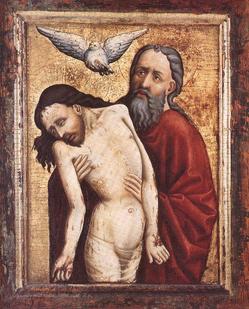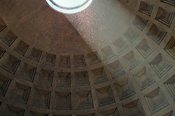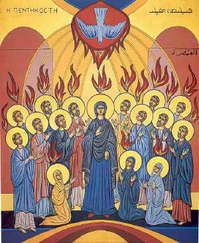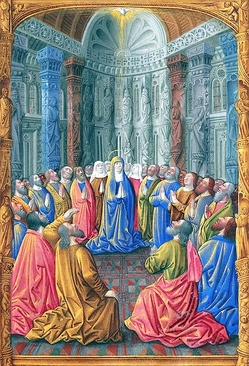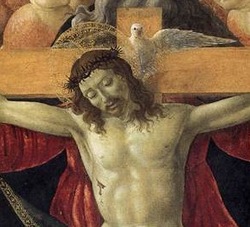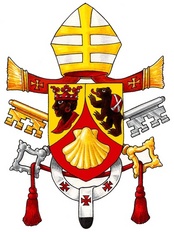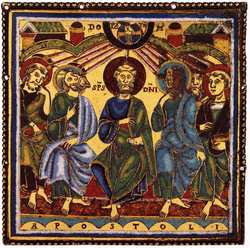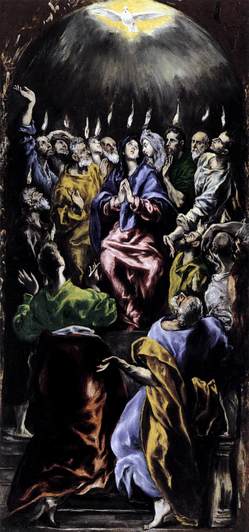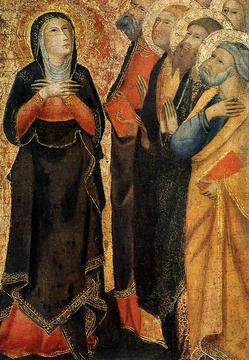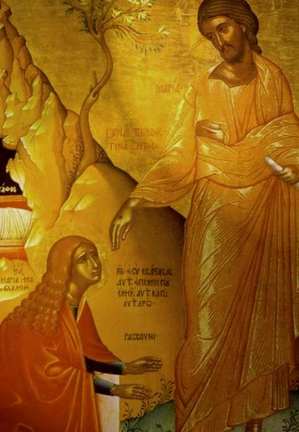"You will receive power when the Holy Spirit comes upon
you, and you will be my witnesses in Jerusalem, throughout Judea and Samaria,
and to the ends of the earth" (Acts 1:8). With these words Jesus bids
farewell to the Apostles, as we heard in the first reading. Immediately
afterward the sacred author adds that "as they were looking on, he was
lifted up, and a cloud took him from their sight" (Acts 1:9). Today we are
solemnly celebrating the mystery of the Ascension. But what does the Bible and
the liturgy intend to communicate to us in saying that Jesus "was lifted
up"? We will not understand the meaning of this expression from a single
text, nor from one book of the New Testament, but in carefully listening to the
whole of Sacred Scripture. The use of the verb "to lift" is in effect
Old Testament in origin and it referred to an installation in royalty. Christ's
ascension thus means, in the first place, the installation of the crucified and
risen Son of Man in God's royal dominion over the world.
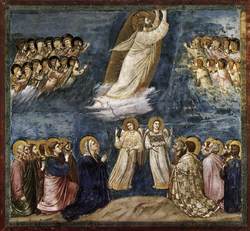
There is a deeper meaning, however, that is not immediately
graspable. The passage from the Acts of the Apostles says first that Jesus was
"lifted up" (1:9), and afterward it adds that "he was
assumed" (1:11). The event is not described as a voyage up above, but rather
as an action of God's power, which introduces Jesus into the space of nearness
to the divine. The presence in the clouds that "took him from their
sight" (1:9) recalls a very ancient image of Old Testament theology and
inserts the Ascension into the history of God with Israel, from the clouds of
Sinai and above the tent of the covenant, to the luminous clouds on the
mountain of the Transfiguration. Presenting the Lord wreathed in clouds
definitively evokes the same mystery expressed in the symbolism of "sitting
at the right hand of God." In Christ ascended into heaven, man has entered
in a new and unheard of way into the intimacy of God; man now finds space in
God forever. "Heaven" does not indicate a place beyond the stars but
something more bold and sublime: it indicates Christ himself, the divine Person
that completely and forever takes on humanity, he in whom God and man are
united forever. And we draw near to heaven, indeed, we enter into heaven, to
the extent that we draw near to Jesus and enter into communion with him. For
this reason, today's Solemnity of the Ascension invites us to a profound
communion with Jesus dead and risen, invisibly present in the life of each of
us.
In this perspective we understand why the evangelist Luke
says that, after the Ascension, the disciples returned to Jerusalem "full
of joy" (24:52). They are joyful because what happened was not a
separation: in fact now they had the certainty that the crucified and risen
Christ was alive, and in him the gates of eternal life were opened forever. In
other words, the Ascension did not begin Christ's temporary absence from the
world but inaugurated instead the new, definitive and insuppressible form of
his presence, by virtue of his participation in the royal power of God. It will
belong to them, to the disciples, emboldened by the power of the Holy Spirit,
to make his presence felt with their witness, preaching and missionary
commitment. The Solemnity of the Ascension of the Lord should fill us also with
serenity and enthusiasm like the Apostles, who returned from the Mount of
Olives "full of joy." Like them, we too, accepting the invitation of
the two men "dressed in white garments," must not stay looking up at
the sky, but, under the guidance of the Holy Spirit, we must go everywhere and
proclaim the salvific message of the death and resurrection of Christ. His own
words -- with which the Gospel according Matthew concludes: "And behold I
am with you all days until the end of the world" (Matthew 28:19) --
accompany and comfort us.
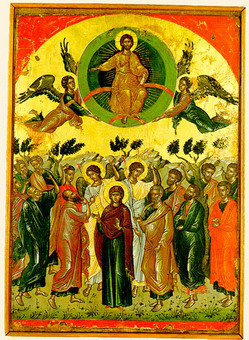
Dear brothers and sisters, the historical character of the
mystery of the resurrection and ascension of Christ helps us to recognize and
to understand the transcendent and eschatological condition of the Church,
which was not born and does not live to take the place of the Lord who has
"disappeared" but which finds its reason for being in his mission and
in the invisible presence of Jesus working with the power of his Spirit. In
other words, we could say that the Church does not carry out the function of
preparing for the return of an "absent" Jesus, but, on the contrary,
lives and works to proclaim his "glorious presence" in an historical
and existential manner. Since the day of the Ascension, every Christian
community advances in its earthly journey toward the fulfillment of the
messianic promises, fed by the Word of God and nourished by Body and Blood of
its Lord. This is the condition of the Church -- the Second Vatican Council
says -- as she "presses forward amid the persecutions of the world and the
consolations of God, announcing the cross and death of the Lord until he
comes" (Lumen Gentium, 8).
Brothers and sisters of this dear diocesan community,
today's solemnity calls on us to reinvigorate our faith in the real presence of
Jesus; without him we cannot do anything of value in our life or apostolate. It
is he, as the Apostle Paul recalls in the second reading, who "made some
apostles, others as prophets, others as evangelists, others as pastors and
teachers, to equip the holy ones for the work of ministry, for building up the
body of Christ," that is, the Church. And he does this so that "we
all attain to the unity of faith and knowledge of the Son of God, to mature to
manhood, to the extent of the full stature of Christ" (Ephesians 4:11-13,
14). My visit today is situated in this context. As your pastor noted, the
purpose of this visit is to encourage you constantly to "build, found and
rebuild" your diocesan community on Christ. How? St. Benedict himself
points the way, recommending in his Rule to put nothing before Christ:
"Christo nihil omnino praeponere" (LXII, 11).
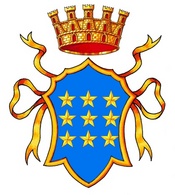
This is why I thank God for the good that your community is
accomplishing under the leadership of your pastor, Father Abbot Dom Pietro
Vittorelli, whom I greet with affection and thank for the kind words that he
spoke to me on behalf of everyone. Together with him, I greet the monastic
community, the bishops, the priests and the men and women religious who are
present. I greet the civil and military authorities, in the first place the mayor,
to whom I am grateful for the speech with which he welcomed me in here in
Piazza Miranda, which will afterwards bear my name. I greet the catechists, the
pastoral workers, the young people and those who in various ways are overseeing
the spreading of the Gospel in this land rich with history, which experienced
moments of great suffering during the Second World War. The many cemeteries
that surround your resort city are a silent witness of this. Among these, I
think particularly of the Polish, German and Commonwealth cemeteries. Finally I
extend my greeting to all the citizens of Cassino and the nearby towns: to
each, especially to the sick and suffering, I assure my affection and my
prayer.
Dear brothers and sisters, we hear St. Benedict's call echo
in this celebration of ours, to keep our hearts fixed on Christ and put nothing
before him. This does not distract us but on the contrary moves us even more to
commit ourselves to the building up of a society where solidarity is expressed
in concrete signs. But how? Benedictine spirituality, which you know well,
proposes an evangelical program synthesized in the motto: "ora et labora
et lege" -- "prayer, work, culture." First of all prayer, which
is the most beautiful legacy that St. Benedict left the monks, but also to your
local Church: to your clergy -- most of whom were formed in the diocesan
seminary, for centuries housed in the Abbey of Monte Cassino itself -- to the
seminarians, to the many who were educated in the Benedictine schools and
recreation programs and in your parishes, to all of you who live in this land.
Looking up from every village and district of the diocese, you can all admire
that constant reminder of heaven that is the monastery of Monte Cassino, to
which you climb every year in the procession on the eve of Pentecost. Prayer --
to which grave peals of the bell of St. Benedict calls the monks every morning
-- is the silent path that leads us directly to the heart of God; it is the
breath of the soul that gives us peace again in the storms of life.
Furthermore, in the school of St. Benedict, the monks always cultivated a
special love for the Word of God in the "lectio divina," which has
become the common patrimony of many today. I know that your diocesan Church,
following the instructions of the Italian Bishops' conference, takes great care
in studying the Bible, and indeed has begun a course of study of the Sacred
Scriptures, dedicating this year to the evangelist Mark and continuing over the
next four years will conclude, please God, with a diocesan pilgrimage to the
Holy Land. May attentive listening to the divine Word nourish your prayer and
make you prophets of truth and love in a joint commitment to evangelization and
human promotion.
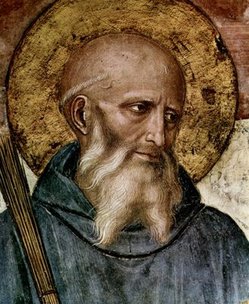
The other hinge of Benedictine spirituality is work. Humanizing
the world of work is typical of the soul of monasticism, and this is also the
effort of your community that seeks to be at the side of the many workers in
the great industry present in Cassino and the enterprises linked to it. I know
how critical the situation of many workers is. I express my solidarity with
those who live in a troubling precariousness, with those workers who on
unemployment assistance and those who have been laid off. May the wound of
unemployment that afflicts this area lead those who are responsible for the
"res publica," the entrepreneurs and those who are able, to seek,
with everyone's help, valid solutions to the employment crisis, creating new
places of work to safeguard families. In this respect, how can we not recall
that today the family has an urgent need to be better protected, since it is
gravely threatened in its very institutional roots? I think also of the young
people who have difficulty finding a dignified job that allows them to build a
family. To them I would like to say: Do not be discouraged, dear friends, the
Church will not abandon you! I know that more than 25 young people from your
diocese participated in last year's World Youth Day in Sydney: treasuring that
extraordinary spiritual experience, may you be evangelical leaven among your
friends and peers; with the power of the Holy Spirit, be the new missionaries
in this land of St. Benedict!
Attention to the world of culture and education also belongs
to your tradition. The celebrated archive and library of Monte Cassino contain
innumerable testimonies of the commitment of men and women who meditated on and
researched ways of improving the spiritual and material life of man. In your
abbey one can touch with one's hands the "quaerere Deum," the fact that
European culture has been constituted by the search for God and availability to
listen to him. And this is important for our time as well. I know that you are
working with this very spirit at the university and in the schools, so that you
become workers of knowledge, research, passion for the future of new
generations. I also know that in preparation for my visit you recently held a
conference on the theme of education to solicit in everyone the lively
determination to transmit to the young people the values of our human and
Christian patrimony that we cannot renounce. In today's cultural effort aimed
at creating a new humanism, faithful to the Benedictine tradition you rightly
intend to stress attention to the fragility, weakness of man, to disabled
persons and immigrants. And I am grateful that you have given me the
possibility today of inaugurating the "House of Charity," where a
culture attentive to life will be built with deeds.
Dear brothers and sisters! It is not hard to see in your community, this portion of the Church that lives around Monte Cassino, is heir and repository of the mission, impregnated by the spirit of St. Benedict, to proclaim that in your life no one and nothing must take Jesus away from the first place; the mission to build, in Christ's name, a humanity to teach hospitality and help of the weakest. May your patriarch help and accompany you, with St. Scholastica his sister; may your holy patrons, and above all Mary, Mother of the Church and Star of our hope, protect you. Amen!
